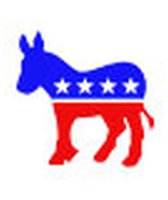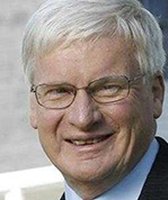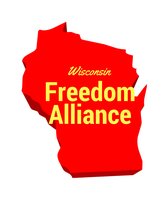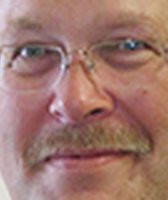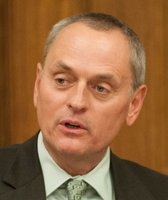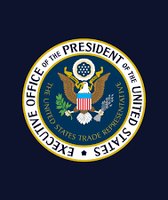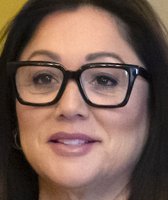Get PolitiFact in your inbox.
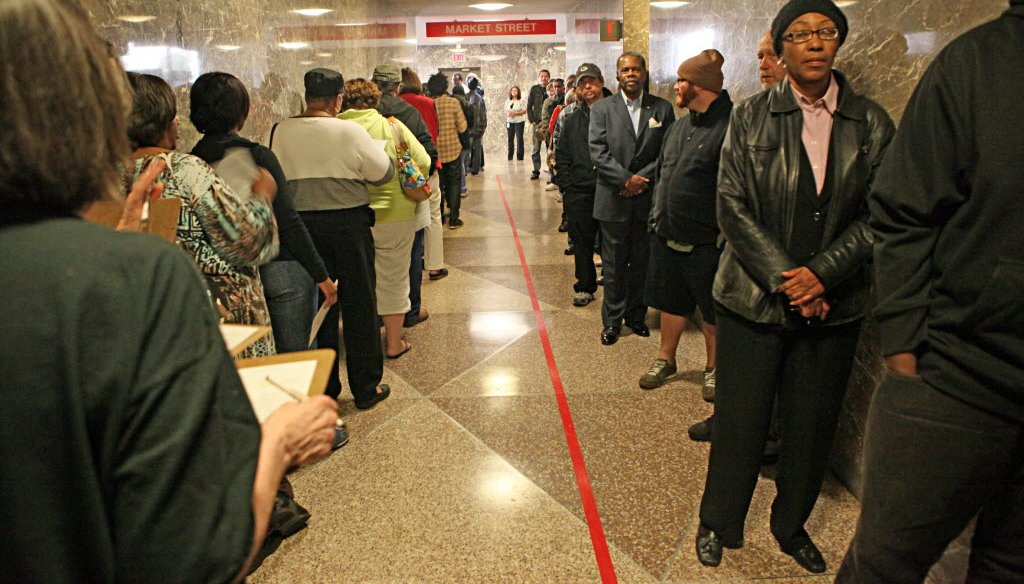
People line up for early voting in the 2012 presidential election. They waited at the Zeidler Municipal Building in Milwaukee. JS photo/Michael Sears
Fear and loathing mark Wisconsin’s latest partisan clash over early voting.
Democrats howl that many urban residents -- who generally happen to favor their side -- will be disenfranchised if early voting is curtailed by Republicans.
Republicans, in turn, argue the increasingly popular option unfairly favors big-city voters -- with the unspoken fear that Dems therefore gain an advantage when all the votes are tallied.
But how much does either party really benefit from early voting?
Probably far less than the intensity of the debate in Madison suggests. But the possible effects can’t be dismissed.
Sign up for PolitiFact texts
That’s what we learned from interviews with experts and an examination of research into what happens when early voting is made easier -- or more difficult.
Wisconsin does not have "true" early voting in that voters don’t cast a regular ballot that is actually counted before election day. Nor does it have a wide variety of locations for voters. Early voting is limited to government offices.
In some states, officials have allowed early voting at casinos, parking lots, shopping malls, even restaurant drive-throughs.
At issue in the debate in Madison is in-person absentee voting. In most case that means people receive, fill out and return their absentee ballot at the same time in person, instead of through the mail.
Such voting currently is allowed during weekdays and on one weekend in the roughly two weeks leading up to the Friday before Election Day. This method -- separate from mail-in absentee voting -- attracted more than 500,000 voters statewide in 2012.
Wisconsin’s Republican-led Legislature, mirroring a few other states, appears likely to send Gov. Scott Walker legislation ending weekend voting before elections and limiting the in-person absentee ballots to a total of 45 hours per week.
Republicans say rural areas are less able to staff extensive in-person voting hours when compared to urban areas with bigger budgets.
In Milwaukee, early voting surged from from 5,000 in 2000 to 36,500 in 2012, with the highest participation rates in mostly African-American areas.
But Milwaukee officials say smaller municipalities -- many in Republican areas -- actually have higher rates of early voting. At the same time, they say, small towns can handle the demand because the raw number of early voters is smaller than in urban areas.
Despite lobbying by the city, state law limits in-person early voting to one voting site, which in Milwaukee has led to long waits at the Zeidler Municipal Building downtown. Based on past volume, under the restrictions in the proposed new law, the city of Milwaukee would only have nine seconds to process each early voter, according to Mayor Tom Barrett.
State Sen. Glenn Grothman (R-West Bend), the bill’s sponsor, said on "Upfront with Mike Gousha" that "Nobody ... dreamed of a municipality using the huge amount of dollars they're getting from the state, like Milwaukee, to say we're going to have voting on weekends."
What the experts say
Political scientists have been studying in-person early voting closely in recent years as more states have added it as an option.
Before 2008, much of the research suggested that early voting did not raise the overall level of voter participation in presidential contests over several decades.
But in Barack Obama’s run to become America’s first African-American president that year, and in major elections since, prominent researchers have detected a small turnout increase due to early voting, especially among black voters.
The effect goes beyond just the enthusiasm around Obama’s historic run, researchers say, and is large enough to potentially play a critical role in deciding very tight races.
But while overall voter turnout may have increased by a small amount due to early voting in presidential elections, the boost is so marginal that some top researchers say it’s not significant.
"Our take on this is that instead of increasing turnout, it just makes it easier for those who would have voted on election day to show up at other times to vote," said Jan E. Leighley, co-author with Jonathan Nagler of "Who Votes Now? Demographics, Issues, Inequality and Turnout in the United States."
But early voting is an opportunity for political parties and candidates to focus on boosting turnout, if they choose, instead of just getting core supporters out early, Leighley said.
Some voices suggest a more significant effect among certain subgroups. The U.S. Justice Department’s voting-rights lawsuit against North Carolina, for example, contends that availability of early voting helped the black turnout rate surpass that of whites in 2008 and 2012.
Most of the research has focused on what happens when early voting is introduced.
Notably, though, newer research is focusing on what happens when states pull back and limit the opportunities to vote early in person.
That’s of particular interest in the Wisconsin debate, and in states such as Florida, North Carolina and Ohio that recently curtailed it.
Florida reduced early voting days before the 2012 presidential election, a move that drew intense criticism when long lines in November marred voting there. In the aftermath, Republican Gov. Rick Scott reversed course and signed legislation restoring the old process.
Did the change in 2012 deflate turnout?
There’s evidence it did, at least among African-American voters who had flocked in 2008 to vote early on the final Sunday before the election, often as part of "souls to the polls" vote drives, said University of Florida political scientist Daniel Smith, who studied the elections with Dartmouth College’s Michael Herron.
Down-ballot races such as for governor and less-prominent offices have received little scholarly scrutiny.
But there’s strong anecdotal evidence from election officials that early voting can significantly hike overall turnout in local contests, said Michael McDonald, a political scientist at George Mason University who produced a report on early voting to Congress.
In McDonald’s view, partisan advantage from expanding or restricting early voting is not necessarily true, because some of those using it are convenience seekers and not very partisan.
A widely publicized study by University of Wisconsin researchers even suggested that early voting options, by themselves, actually reduce overall turnout, in part because Election Day hoopla is diminished. The study was published in 2014.
One of the authors, Barry Burden, cautioned that it doesn’t compare easily to other early-voting studies because it lumped in traditional mail-in absentee voting with in-person early voting. Several prominent researchers have criticized the study’s design.
End game
The current legislation in Wisconsin is just the latest twist on the issue.
Before 2012, Wisconsin allowed in-person absentee voting over about three weeks, three weekends and the Monday prior to the election, noted City of Milwaukee Election Commission Neil Albrecht.
As noted, the Legislature and Walker compressed that schedule in 2011.
That didn’t reduce early voting turnout in Milwaukee, which rose from about 32,500 in 2008 to 36,500 in 2012, but Albrecht says the cutback in days held the increase down and caused those long lines.
"The working poor, single parents, students, people with disabilities, or anyone else that might have an Election Day schedule conflict or concern about limited physical access to their voting site" are among those who seek out the opportunity to vote early, Albrecht said.
The Badger State historically has one of the highest turnout rates of any state in big elections, which election officials attribute in part to same-day voter registration, no-excuse absentee voting and other things that encourage access.
If that means more early voting opportunities would boost turnout even more, it might result in just a muted gain here.
"There’s only so much more you can do," said Paul Gronke, a political scientist at Reed College and director of the Early Voting Information Center.
Our Sources
Interview with Neil Albrecht, City of Milwaukee Election Commission, executive director, March 13, 2014
Interview with Kevin Kennedy and Reid Magney, Wisconsin Government Accountability Board, March 13, 2014
Interview with Jan Leighley, professor, department of government, American University, March 13, 2014
Interview with Daniel Smith, professor, department of political science, University of Florida, March 13, 2014
Interview with Barry Burden, professor, UW-Madison department of political science, March 12, 2014
Interview with Michael McDonald, associate professor of government and politics in the department of public and international affairs at George Mason University, March 13, 2014
Interview with Paul Gronke, professor of political science, Reed College, March 13, 2014
Interview with Erik Opsal, senior communications coordinator, Brennan Center for Justice, March 13, 2014
Interview with Alicia Boehme, advocacy specialist, Disability Rights Wisconsin, March 13, 2014
United States Election Project, "2012 Early Voting Statistics," George Mason University
Massachusetts Institute of Technology, "The Perverse Consequences of Electoral Reform in the United States," Berinsky, 2005
University of Wisconsin, "Election Laws, Mobilization and Turnout: The Unanticipated Consequences of Election Reform," Burden, Canon, Mayer, Moynihan, published 2014
The Foundry, Heritage Foundation blog, "Five myths about voting," Oct. 17, 2012





